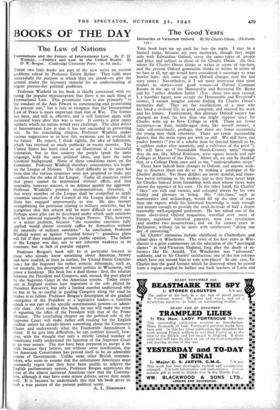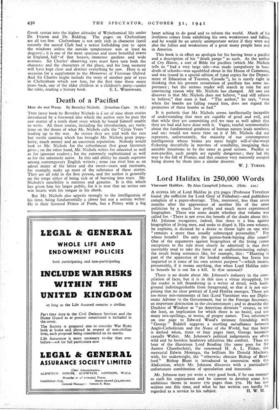The Good Years
Memories of Victorian Oxford. By Sir Charles Oman. (Methuen. Iss.)
THIS book kept me up until far into the night. I may be a biassed judge, because my own memories, though they begin only with Edwardian Oxford, cover the same• types of people and place and subject as those of Sir Charles Oman. (In fact, where Sir Charles Oman thinks or writes in terms of top-hats, and the present Oxford generation thinks or writes in terms of no hats at all, my age would have considered it necessary to wear bowler hats : this sums up most Oxford changes over the last sixty years.) Nevertheless, if I am more interested than most readers in stories—very good stories—of Oxford Common Rooms in the age of the Honourable and Reverend Dr. Bertie and his " rather drunken butler " (Yes : those two men existed, I, a humbler figure, now occupy the Honourable and Reverend's rooms), I cannot imagine anyone finding Sir Charles Oman's memories dull. They are the recollections of a man who has lived a civilised life, in good company, and enjoyed his work and his leisure. Furthermore, this pleasant Oxford society has changed au fond, far less than one might suppose since Sir Charles went up to New College in 5878. There are fewer eccentrics—at least, middle-aged dons like myself assume, a little self-consciously, perhaps, that there are fewer eccentrics; the young may think otherwise. There are fewer outstanding figures, but the main types are with us still. We still have our pocket Jowetts (" less of a scholar than he fancied himself to be, a ruthless seeker after notoriety, and a cultivator of the great "). We still have our "formidable North-Country men," though they do not, like Alfred Robinson, wear square beards and rule Colleges as Mayors of the Palace. Above all, we can be thankful that, as a College Dean once said to me, " undergraduates recur."
There have indeed been changes in Oxford, and anyone wish- ing to discover them can do so by making a catalogue of Sir Charles' dislikes. Yet those dislikes are never spiteful, and there- fore never irritating to his readers, just as they have never kept Sir Charles himself from friendship with men whose views were almost the opposite of his own. On the other hand, Sir Charles' " likes " are rich and various, and coloured always by his own vitality and pleasure in living. His " side-lines," such as numismatics and archaeology, would fill up the time of more than one expert, while his historical knowledge is wide enough and minute enough to provide the stock-in-trade of half a dozen reasonably well-equipped professors. He has edited one of the many short-lived Oxford magazines, travelled over most of Europe, organised historical pageants, seen two revolutions (and another two insurrections), and sat for sixteen years in Parliament, without (as he notes with satisfaction) " doing one day of canvassing."
Sir Charles' memories include childhood in Cheltenham and school days at Winchester. The story of his first years at Win- chester is a grim commentary on the education of the " privileged classes" in mid-Victorian England, long after the death of re- formers like Dr. Arnold. Yet Winchester was " reformed," suddenly, and to Sir Charles' satisfaction; one of the few reforms which have not moved him to vote non-placed In any case, Sir Charles met the good fortune which he deserved when he passed from a region peopled by bullies and hack teachers of Latin and Greek syntax into the higher altitudes of Wykehamical life under Dr. Fearon and Dr. Ridding. The pages on Cheltenham are all too few. Cheltenham is not only rich in character (until recently the sacred Club had a notice forbidding you to open the windows unless the outside temperature was at least 6o degrees) ; it is one of the most spacious and most beautiful towns in England, full • of fine houses, immense gardens and wide avenues. Sir Charles' observing eyes must have seen both the character and the characters of the place, and his long memory will have kept clear and distinct everything lie saw. Here is an occasion for a supplement to the Memories of Victorian Oxford. And Sir Charles might include the story of another pair of eyes in Cheltenham which saw him, for the first time these many years back, one of the elder children at a children's party—under























 Previous page
Previous page